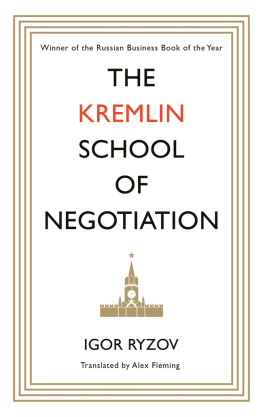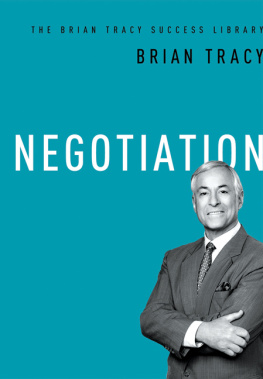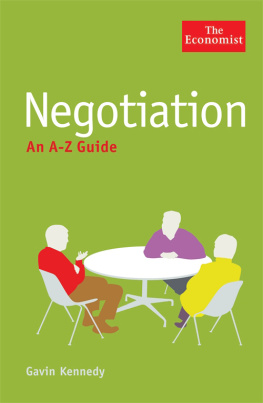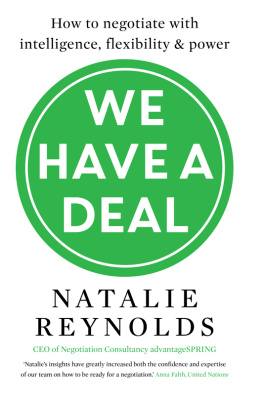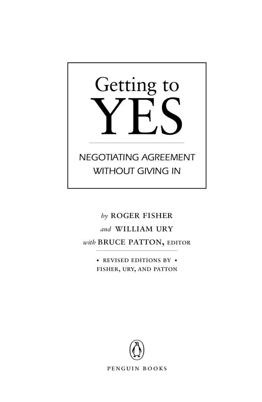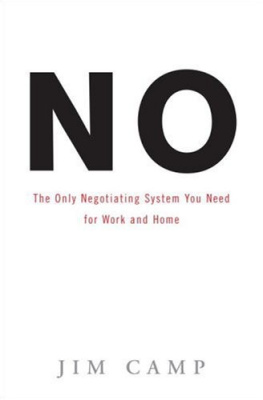THE KREMLIN SCHOOL
OF NEGOTIATION
THE KREMLIN SCHOOL
OF NEGOTIATION
IGOR RYZOV
TRANSLATED BY ALEX FLEMING

First published in Great Britain, the USA and Canada in 2019
by Canongate Books Ltd, 14 High Street, Edinburgh EH1 1TE
First published in Russia in 2016 by Eksmo Publishing House LLC
Distributed in the USA by Publishers Group West
and in Canada by Publishers Group Canada
canongate.co.uk
This digital edition first published in 2019 by Canongate Books
Copyright Igor Ryzov, 2016
Translation Alex Fleming, 2019
The moral right of the author has been asserted
Every effort has been made to trace copyright holders and obtain their permission for the use of copyright material. The publisher apologises for any errors or omissions and would be grateful if notified of any corrections that should be incorporated in future reprints or editions of this book.
British Library Cataloguing-in-Publication Data
A catalogue record for this book is available on
request from the British Library
ISBN 978 1 78689 617 9
CONTENTS
AUTHORS NOTE
W hat prevents us from achieving our goals? The answer, of course, will depend on the situation. Whenever a person has a goal they want to accomplish, they will first (if they are mildly practical, at least) consider what obstacles they will have to overcome. And often theyll find that the list of potential obstacles could quite easily go on forever.
So what prevents negotiators even very experienced ones from achieving their goals? Inflexibility, unwillingness to compromise, personal ambitions... yes, that list could also go on for a while.
In my workshops, I am often asked similar questions. When I answer, I always give thought to the specific circumstances at hand. However, over the years I have come to realise that it would make sense to provide some more general answers, too. This is how the idea for this book was born, although it should be said, it isnt only about providing answers. With this book, I wanted to create a teaching aid to guide you through one of the most complex disciplines of any business course a negotiation manual, if you like. In it, I have included exercises that will not only help you to discover a variety of effective negotiation methods, but, more importantly, to put them into practice straight away. This book will become your very own negotiation tool, a personal arsenal of combat techniques.
When I say you, I mainly have in mind those who have already discovered negotiation as both a science and a true art. This book will be of use to anyone who wants to prepare for negotiations in advance, considering all of the possible steps and alternative scenarios that might arise. These are no empty words: in my own studies which include time spent at the Camp Negotiation Institute in the USA I have always tried to put the most valuable lessons into practice. Every thought set down on these pages has passed through my own personal prism of perception, experience and awareness. Barring the odd historical or diplomatic reference, all of the examples in this book come from my own experience. The recommendations and advice have been honed over time, and their advantages thoroughly analysed. So who has been doing this analysis, and when?
Well, reader, at the risk of sounding arrogant, the answer is: me. A man with over seventeen years experience in sales and purchasing. A man who has spent almost half of his sixteen-hour working day leading tough often at first glance hopeless business negotiations.
Let me establish one point up front: despite the books title, these negotiation techniques in no way encourage rudeness or excessive pressure. Quite the opposite, as it happens.
Modern life often pits us against a wide range of characters from yobs to louts, ball-breakers to princes with whom, like it or not, we still have to do business. These peoples negotiating styles can, if not completely discourage and confuse, make it hard for us to get the results we need.
In this book, I will also present to you the special techniques for tough negotiations employed, among others, by the Russian secret services. Here, you will learn some basic strategies that will allow you to put yourself in the driving seat and maintain command in complex negotiations. In addition, you will also get the chance to perfect and put into practice skills that will help you to steer tough negotiations. These skills must be honed, so this book comes complete with extensive exercises. Negotiation is, first and foremost, about practice. Good luck!
LOOK OUT FOR THESE SYMBOLS:

| important information / key points |

| examples and situations |

| definitions and rules |

| conclusions |

| anecdotes |

| stratagems |

| examples from history and diplomacy |

| questions for the reader |

| exercises |
INTRODUCTION
I am sure we all have a clear memory of the things we enjoyed doing when we were little kids; as we grew up; when we got our first student cards... Well, when I was a student I, like many of my friends and classmates, took up karate. It was an exciting sport with a certain prestige, and besides, damnit, I was a man! You can probably picture how our training sessions looked: a giant sports hall, a coach teaching kids specific moves, skills and techniques. Of course, there was one golden rule: no fighting in the streets. Wed spar, of course, but within the sports hall contact was always limited it was something dangerous, forbidden. Even so, we could (and generally did) consider ourselves successful fighters: after all, we took part in meets and workshops, went to sports camps, learned and perfected new moves, showed off our skills at various competitions which we won, of course, earning ourselves belt after belt. So we were justified in thinking we were serious fighters. We had complete confidence in our skills and in ourselves. However, one very banal event put us all back in our place.
Late one night, me and the guys were on our way home from practice. Three kids that looked like bad news came up to us and asked us for a smoke. Now, in that sort of situation, a request for a smoke never feels completely harmless; it was fairly reasonable for us to expect it to be followed up with some trick straight out of the playbook. But hey, we did karate, we werent about to let them scare us! So what did we do? You guessed it. Without the slightest doubt in our own professionalism, we immediately decided to fight. Of course we did: we were sportsmen, we had mastered a true martial art we definitely had the upper hand. On paper, that is. But.

